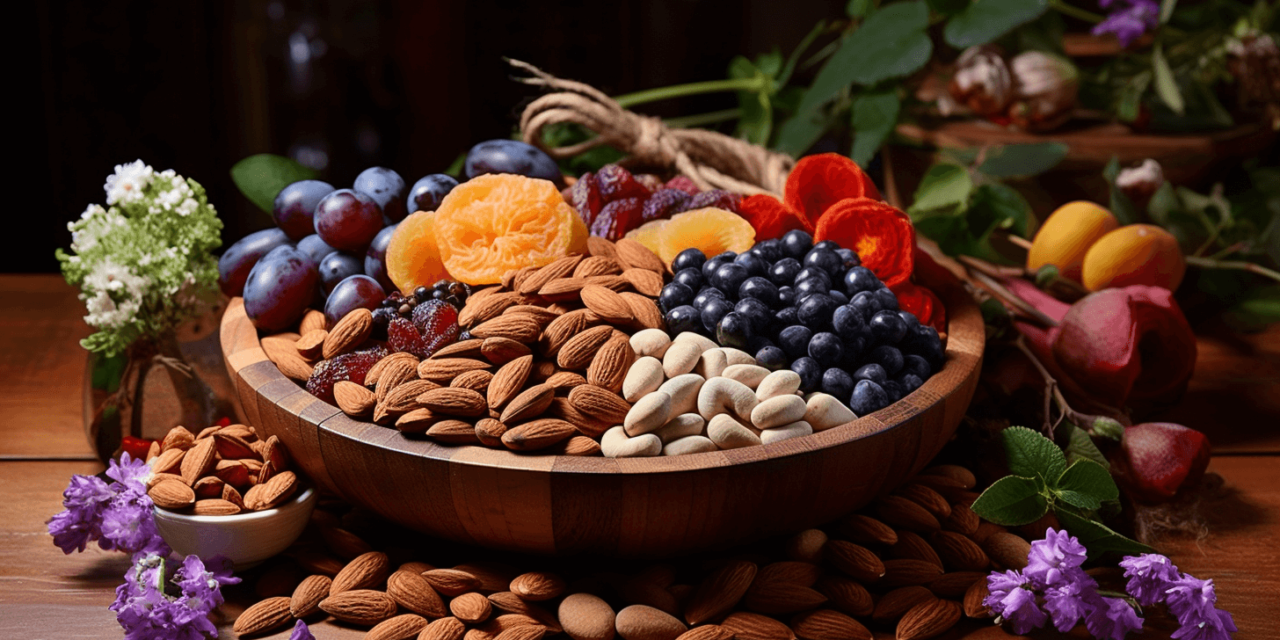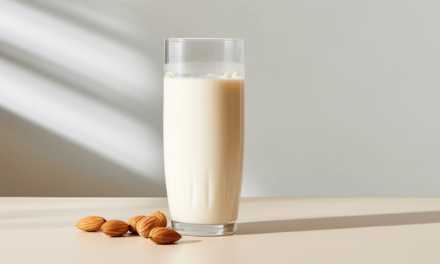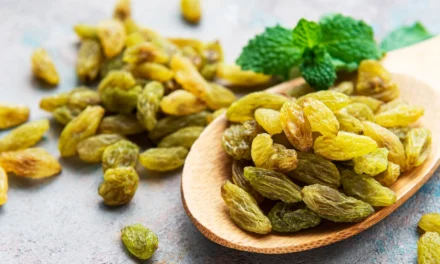People often turn to various products and treatments for healthy, lustrous
hair. However, the key to beautiful hair might be hiding in your kitchen pantry.
Nutrient-packed dried fruits have been celebrated for their many health advantages,
including their ability to support healthy hair growth.
This detailed guide will explore which dry fruit is good for hair. And discuss creative
ways to include them in your diet.
Table of Contents
Overview of Essential Nutrients for Hair Growth:
To understand how nutrients in dry fruits benefit hair growth, it’s essential first to grasp
the fundamental nutrients required for healthy hair. These include:
Proteins:
Hair is predominantly composed of a protein known as keratin, and ensuring
you have enough protein in your diet is essential for maintaining the structure and
promoting the growth of your hair.
Vitamins:
Several vitamins play pivotal roles in hair health. These include:
Vitamin A: Promotes the production of sebum, a natural hair conditioner, and supports
hair follicle health.
Vitamin C: Aids in collagen production, essential for hair structure and strength.
Vitamin E: An antioxidant that helps improve blood circulation to the scalp, promoting
hair growth.
Minerals:
Minerals are also vital for hair health. Key minerals include:
Zinc: Supports hair tissue growth and repair, preventing hair loss.
Iron: A shortage of iron in the body can contribute to hair thinning and loss,
underscoring the importance of maintaining adequate iron levels for healthy hair.
Fatty Acids: Including nutritious fats, especially omega-3 fatty acids, in your diet
significantly contributes to scalp health and ensures that your hair stays hydrated.
Best Dry Fruits for Hair Growth
This section focuses on discussing various dry fruits good for hair growth. Dry fruits are
often rich in essential nutrients that can contribute to healthy hair.
Almonds
Almonds are a popular dry fruit known for their numerous health benefits, including
promoting hair growth.
Nutrient Content:
Protein: Almonds are a good source of protein, which is vital for supporting hair growth
since hair consists mainly of a protein known as keratin.
Healthy Fats: Almonds are an excellent source of beneficial fats, including
monounsaturated fats and omega-3 fatty acids, actively bolstering scalp health and
promoting overall hair growth.
Vitamins: Moreover, almonds boast a wealth of vitamin E, which has the potential to
enhance blood circulation to the scalp and nurture the health of hair follicles.
Minerals: Furthermore, almonds are packed with crucial minerals like magnesium,
which can play a pivotal role in averting hair loss.
Benefits for Hair:
Strengthening: Almonds’ protein and healthy fats can strengthen hair strands, making
them less prone to breakage.
Scalp Health: Vitamin E in almonds plays a pivotal role in maintaining a healthy scalp,
a critical factor in promoting hair growth.
Preventing Hair Loss: The diverse array of nutrients found in almonds can help
prevent hair loss and enhance the overall health of your hair.
Walnuts
Walnuts are another dry fruit known for their nutritional value and potential benefits for
hair.
Nutrient Content:
Omega-3 Fatty Acids: Walnuts are abundant in omega-3 fatty acids, known for their
anti-inflammatory properties that can reduce inflammation and maintain a healthy scalp.
Biotin: Walnuts also contain biotin, a crucial B vitamin essential in promoting and
maintaining healthy hair.
Vitamins and Minerals: Furthermore, walnuts supply an array of vitamins and minerals
that actively support hair growth, including vitamin E, zinc, and selenium.
Benefits for Hair:
Reducing Hair Fall: The omega-3 fatty acids found in walnuts can play a pivotal role in
minimizing hair fall by fortifying hair follicles.
Enhancing Hair Texture: Incorporating walnuts into your diet regularly may lead to
improved hair texture and a shinier appearance.
Preventing Dandruff: Nutrients like biotin in walnuts effectively prevent dandruff and
promote a healthy scalp.
Dates
Dates are a sweet and nutritious dry fruit that improves hair health.
Nutrient Content:
Iron: Dates are a good source of iron, essential for maintaining healthy hair and
preventing hair loss.
Vitamins: They contain vitamins like vitamin B6, which supports hair growth.
Benefits for Hair:
Preventing Anemia: The iron in dates helps prevent anemia, which can lead to hair
loss.
Improved Hair Health: Dates can improve hair health by providing essential vitamins
and minerals.
Pistachios
Pistachios are a tasty dry fruit that offers various nutrients beneficial for hair.
Nutrient Content:
Protein: Pistachios contain protein, which is essential for hair structure.
Vitamins and Minerals: They provide vitamins like biotin and minerals like zinc, both of
which support hair growth.
Benefits for Hair:
Promoting Hair Growth: The combination of protein, biotin, and zinc in pistachios can
encourage hair growth and thickness.
Reducing Hair Fall: These nutrients can also help reduce hair fall and breakage.
Raisins
Raisins are dried grapes that offer several nutrients relevant to hair health.
Nutrient Content:
Iron: Raisins contain iron, important for preventing anemia and supporting hair growth.
Antioxidants: They are rich in antioxidants, which can help maintain a healthy scalp.
Benefits for Hair:
Hair Strength: Iron in raisins contributes to stronger hair and less hair fall.
Scalp Health: Antioxidants protect the scalp from oxidative stress and inflammation,
promoting a conducive environment for hair growth.
Dried Apricots
Dried apricots are a nutritious dry fruit with potential benefits for hair.
Nutrient Content:
Vitamins: Dried apricots contain vitamins like vitamins A and C, which are essential for
hair health.
Iron: They also provide iron, supporting the prevention of hair loss.
Benefits for Hair:
Healthy Hair Growth: Vitamins A and C in dried apricots support the production of
sebum, an oily substance that moisturizes the scalp and promotes healthy hair growth.
Hair Strength: Iron helps strengthen hair and prevents brittleness.
Incorporating Dry Fruits into Your Diet
Incorporating dried fruits into your diet is a delightful treat and a nutritious approach to
enhancing your overall health and increasing your energy levels. These dried gems are
brimming with vital nutrients such as vitamins, minerals, fiber, and healthy fats, making
them a valuable and healthful addition to your daily eating regimen.
Here are some suggestions for seamlessly including dried fruits in your eating routine:
Snacking on Dry Fruits:
Raw Snacking:
A straightforward way to savor dried fruits is by enjoying them as a
standalone snack. Maintain a small assortment of mixed dried fruits, such as almonds,
walnuts, and apricots, in a container for a speedy, hassle-free snack. These nuts and
fruits provide a satisfying crunch and natural sweetness that can help curb your hunger
between meals.
Trail Mix:
Create your trail mix by combining various dry fruits with seeds, such as
pumpkin or sunflower seeds. You can add a touch of dark chocolate chips or dried
berries for extra flavor. Trail mix is a portable, energy-boosting snack, perfect for hiking
or on-the-go munching.
Adding Dry Fruits to Meals:
Breakfast: Elevate your breakfast experience by adding a touch of indulgence –
sprinkle chopped dried fruits such as almonds, raisins, or cranberries onto your morning
cereal or oatmeal. You can also blend them into yogurt or into your smoothies, infusing
extra texture and nutritional goodness into your meals.
Salads: Toss a handful of chopped or sliced dry fruits like pistachios, dates, or figs into
your salads. They can add a delightful contrast of flavors and textures to your greens.
Main Courses: Dried fruits can also play a role in savory dishes. For instance, you can
incorporate them into rice pilaf, use them as part of poultry stuffing, or employ them as a
curry garnish. Their inherent sweetness can effectively counterbalance the savory
flavors in your dishes, adding a delightful twist to your meals.
Other Tips for Hair Growth
Here are some additional tips for promoting hair growth and maintaining healthy hair:
Maintaining a Balanced Diet:
Protein Intake: Make sure your diet provides ample protein, as hair primarily consists
of a protein called keratin. Include sources like lean meats, poultry, fish, eggs, dairy
products, legumes, and nuts to meet your protein needs.
Vitamins and Minerals: Consume foods rich in vitamins and minerals essential for hair
health. Vitamin A in sweet potatoes and carrots helps promote healthy hair growth.
Vitamin E in nuts and seeds contributes to overall hair health. Biotin, found in eggs and
nuts support hair strength.
Iron-rich Foods: Iron plays a vital role in hair growth. Include iron-rich foods like lean
red meat, spinach, and lentils to prevent iron deficiency-related hair loss.
Omega-3 Fatty Acids: Omega-3 fatty acids in fatty fish, flaxseeds, and walnuts help
maintain scalp and hair hydration. It reduces the risk of having dry, brittle hair.
Hydration and Its Role in Hair Health:
Hydration plays a vital role in maintaining healthy hair. Much like our bodies, hair
requires adequate hydration to flourish. When hair is deprived of moisture, it becomes
dry, fragile, and susceptible to breakage.
Additionally, a well-hydrated scalp fosters optimal conditions for hair growth, reducing
dandruff and itchiness. In summary, staying hydrated internally and externally is
essential for maintaining vibrant and strong hair.
Avoiding Hair-Damaging Habits:
Excessive Heat Styling: Limit heat-styling tools like hairdryers, straighteners, and
curling irons, as extreme heat can damage hair and lead to breakage. Use
heat-protectant products before styling.
Avoid Tight Hairstyles: Refrain from wearing hairstyles that put excessive tension on
your hair, such as tight ponytails or braids. These styles can stress and damage the hair
shaft, potentially leading to breakage.
Mindful Washing: Don’t overwash your hair, as frequent washing can strip it of its
natural oils, causing dryness and potential damage. Determine a washing frequency
that suits your hair type and lifestyle. Some people may need to wash daily, while others
can go longer between washes.
Chemical Treatments: Be cautious with chemical treatments like perms, relaxers, and
frequent coloring, as these can weaken hair structure. If you do use such treatments,
ensure proper care and conditioning afterward.
Frequently Asked Questions:
Can I consume dry fruits daily for better hair growth?
Dry fruits can be a nutritious addition to your daily diet when consumed in moderation.
Are there any side effects of consuming dry fruits for hair growth?
Dry fruits are generally safe when consumed in moderation. However, overconsumption
can lead to excessive calorie intake.
Can dry fruits alone guarantee hair growth, or do I need a comprehensive hair
care routine?
While dry fruits provide essential nutrients for hair growth, maintaining overall hair
health requires a comprehensive approach. It includes a balanced diet, proper
hydration, hair care practices, and addressing underlying health issues.



